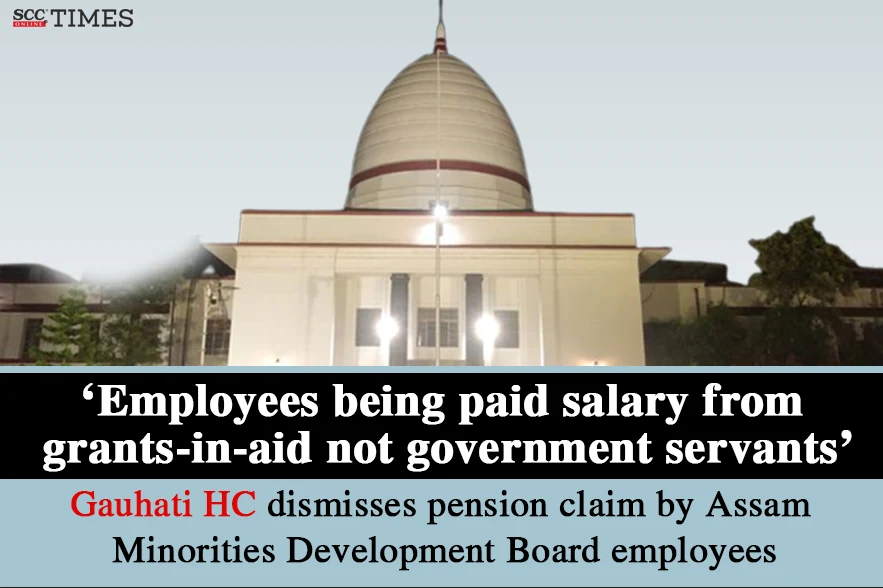Gauhati High Court: The present appeal challenged judgment of the Single Judge, whereby petitioner’s claim for pension was rejected, a division bench of Ashutosh Kumar CJ*. and Manish Choudhary J., upheld the decision of Single Judge and stated that even though Assam Minorities Development Board (‘Board’) might come within the definition of “State” under Article 12 of the Constitution for other purposes, but the employees of the Board, who were being paid their salary from grants-in-aid, would not be called government servants and are not qualified for getting pension under Rule 31 of the Assam Services (Pension) Rules, 1969 (‘1969 Rules’).
Background:
The petitioners were appointed as Grade-III and Grade-IV employees via government orders and were later permanently retained by the Assam Minorities Development Board. The GPF (General Provident Fund) accounts of the petitioners were opened on 6-12-2012, suggesting recognition of their employment status. On 25-4-2013, the Director of the Board had communicated with the Department regarding payment of pension to the petitioners. However, the Department rejected the claim stating that since the Board was registered under the Societies Registration Act, 1860, the employees were not entitled to pensionary benefits and the petitioners did not fall under the Assam Services (Pension) Rules, 1969.
In Ismail Ali v. State of Assam, 2024 SCC OnLine Gau 1831, the Single Judge Bench while dismissing the petition had observed that though the posts were permanently retained, the sanction was only for a limited period and the petitioners were paid out of the grants-in-aid provided by the government, rather than regular Government Salary Budget, which came under ordinary Head. Further, though the Board had State presence and lay within the ambit of Article 12 of the Constitution, there would be a distinction between a body which was taken to be a State within the meaning of Article 12 of the Constitution, and a body which would be foisted with financial burden. Aggrieved by this the present appeal was filed in the Court.
Case Analysis and Decision:
The Court noted the petitioners’ submission that the Single Judge had not appreciated the fact that they had been serving under the Board for a long time on the posts sanctioned and permanently retained by the State Government making them qualified for getting pension under Rule 31 of the 1969 Rules.
The Court observed that the Single Judge had relied on State of Assam v. Barak Upatyaka D.U. Karmachari Sanstha, (2009) 5 SCC 694, whereby the Supreme Court had held that even if a Board or a cooperative society was treated to be State within the definition of Article 12 of the Constitution of India, it would not be considered as State Government and the employees in such a body would not be called the holders of civil posts, or employees of the State.
The Court observed that even though the Board in question might come within the definition of “State” for other purposes, but the employees of the Board, who were being paid their salary from grants-in-aid, would not be called government servants.
The Court further observed that while Rule 31 of the 1969 Rules is very categorical in stipulating the conditions of qualifying service for being entitled for pension however, there is a caveat by way of a proviso which declares that the Governor may, even though the conditions under Rule 31 are not fulfilled, declare any specified kind of service rendered in a non-Gazetted capacity to be qualified for pension, and in individual cases and subject to such conditions, as he may think fit to impose in each case, allow service rendered by an officer to count for pension.
The Court observed that the Single Judge had noted that the petitioners were employees of the Board and served on conditionally sanctioned posts, which were permanently retained, and they were being paid their salary from grants-in-aid and not from the ordinary Head for disbursement of salary of the government employees. The Court thus finding no reason to interfere with decision of Single Judge dismissed the petition.
[Ismail Ali v. State of Assam, 2025 SCC OnLine Gau 4255, decided on 21-8-2025]
*Judgement authored by: Ashutosh Kumar, Chief Justice
Advocates who appeared in this case:
For the Petitioners: A. Deke, Advocate
For the Respondent: M.D. Borah, SC, WMDD, S.K. Medhi, SC, AG, S. Sarma, GA, Assam



